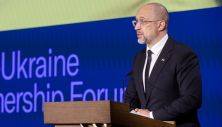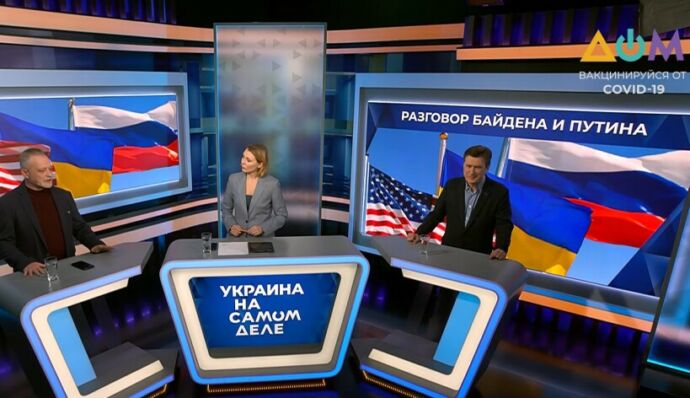On December 7, the presidents of the United States and Russia, Joseph Biden and Vladimir Putin, held talks. They were on secure video and lasted more than two hours instead of the scheduled one hour.
The virtual summit took place against the backdrop of an unprecedented escalation in recent years near Ukraine’s borders: Russia has withdrawn troops, and anti-Ukrainian rhetoric in statements by Russian officials and in the media is at its peak again. Official Kyiv and the West talk about the risk of a new invasion. Moscow, as expected, denies everything.
The key topic of the talks was the threat of Russian invasion of Ukraine. Following the meeting at the White House, it was announced that the US President had made it clear to the Kremlin leader that the United States and its allies would not leave Russia’s aggression against Ukraine unanswered.
“President Biden has expressed deep concern to the United States and our European allies about Russia’s escalation of forces around Ukraine, and has made it clear that the United States and our allies will respond with decisive economic and other measures in the event of military escalation. President Biden reaffirmed his support for Ukraine’s sovereignty and called for de-escalation and a return to diplomacy, the White House said in a statement.
It is also reported that the presidents discussed the US-Russia dialogue on strategic stability and a number of other issues.
This is the fourth talks between Putin and Biden since the latter took office. The last meeting took place on June 16, 2021 in Geneva, when the presidents spoke in person. Biden then reiterated US unwavering support for Ukraine’s sovereignty, but in general, according to experts, the most valuable thing at the Geneva meeting was the fact that it was held.
After talks with Vladimir Putin on December 7, US President Joe Biden spoke with European leaders. A telephone conversation with the head of Ukraine Volodymyr Zelenskyy will take place on Thursday, December 9.
The first results of the virtual meeting of Joe Biden and Vladimir Putin in the UA TV program are being discussed with political scientists Volodymyr Fesenko and Andrei Zolotariov.
Alyona Chornovol hosts the program.
– What are your expectations and forecasts for this meeting?
Zolotariov: I did not expect any strategic agreement to be reached. In addition, there will be no breakthrough in the relationship. Moreover, such a growing degree of confrontation suggested that there were still many differences.
Apparently, a dialogue was held on the “red lines”, the rules of confrontation were agreed upon. And I think that most likely the parties did not agree on Ukraine. And any unforeseen coincidence can turn into a big trouble.
Yes, there are encouraging notes, but so far very fragmentary, a little.
– We remember the Geneva meeting between Biden and Putin. After that, Biden set a six-month break, during which time the parties had to determine whether they understood each other. Six months have passed, here is a new meeting. So what happened during those 6 months?
Fesenko: Many sources have noted on the basis of an unofficial source that the meeting in Geneva did not really yield results. The very fact of this meeting was important. As, by the way, and now.
The very fact of negotiations is important. What is important? The fact that the parties are willing to agree. If they did not want to agree, it would be a very bad signal. And yes – they are ready to agree on something.
But I absolutely agree with Andriy that this is not a situation where the parties can agree. Since Biden cannot make any public concessions, including the ultimatums that Putin officially announced before the meeting, Russia must be assured that Ukraine will not advance to NATO. Biden can’t do that because it would be a public surrender. And he already has a difficult situation in the United States. But this is against American interests.
However, I still think that the parties really want to find some points of understanding, to mark the “red lines” that cannot be crossed. Because it was at the meeting in Geneva, judging by the indirect signs, the parties agreed on a certain status quo. Do not create any unpleasant surprises for each other, keep everything as it is. That is, there should be no surprises about Ukraine, not only from the United States, but also Russia should not invade Ukraine.
In principle, this was more or less sustained. But recent months have been unsettling, at least since late October. This can be explained in different ways. In my opinion, the most likely version, as it was in the spring before the meeting in Geneva, is that Putin is playing with muscles. It is a very comfortable situation for him that he is negotiating from a position of strength. Therefore, the concentration of troops is a kind of political and psychological blackmail of Biden, Western leaders, but also an attempt to persuade them to make some concessions.
But I do not rule out that the situation is more serious now, and Russian troops on our border may remain for a longer period. Because Russia is watching
Will monitor the situation in Ukraine. And if there are any problems in Ukraine, Russia can take advantage of it.
Therefore, this time the talks between the two presidents will not solve all the problems. Although our expected result is that at least in part, military tensions at the border have been lifted.
And the second result is whether the United States will take part in the negotiations on Donbass. I think in the Normandy format – hardly. But to restore a separate parallel channel of negotiations, as it was before (Victoria Nuland – Surkov, then Kurt Walker – Surkov) – this is possible. Russian Foreign Minister Sergei Lavrov hinted that, in principle, this can be agreed. Therefore, there may be some agreements. On other issues – no.
– The Biden-Putin conversation is about Ukraine, but without the presence of Ukraine. However, on the eve of this conversation, Ukrainian President Volodymyr Zelensky had a telephone conversation with US Secretary of State Anthony Blinken. Blinken once again assured the support of the United States of Ukraine that sanctions against Russia will be maintained and so on. That is, it turns out that the main topics that Biden will raise in his conversation with Putin have been discussed in advance.
Zolotariov: The Zelenskyy-Blinken conversation says that there is a dialogue. This dialogue is normal. He is not overshadowed by any political intrigues, scandals. What happened a few years ago during Poroshenko’s presidency, when Biden probably knows better than others how he had to unravel the intrigues between President and Prime Minister Yatsenyuk. He knows this well.
At present, even supporters of the ex-president cannot throw a stone in the sense that Volodymyr Zelensky is being ignored in the White House. There is no such thing. there is a normal dialogue.
– The dialogue with the United States is normal. And what about Russia? There have been repeated initiatives by the President of Ukraine to hold a tete-a-tete meeting with Putin, in any format, anywhere.
Fesenko: You mean what Volodymyr Zelenskyy said during his address to the Verkhovna Rada (on the need for direct talks with Russia, ed.). This then surprised someone, alarmed someone. What is it for? I think it was no accident. Most likely, it was a statement in the context of future talks between Biden and Putin.
And I do not rule out that during this video conversation between Biden and Putin, the topic of intensifying the dialogue between Ukraine and Russia could be discussed. In particular, a direct dialogue, which may involve the same video conference, only between the Russian and Ukrainian presidents. That is, it could be about that.
Why, what’s the point here? First, like Biden’s meeting with Putin, to ease tensions. Negotiations are better than military confrontation. This is an old diplomatic truth. Therefore, it is better to start negotiations and try to relieve tension.
The second important point. Two main topics that can be discussed with the Russian president.
The first is, of course, the cessation of hostilities in Donbas. Russia wants to force us into direct contact with the separatists. This is unacceptable for Ukraine. Therefore, there is unlikely to be significant progress. However, you can try to agree, at least informally, to agree on a new truce at the level of the Tripartite Contact Group.
Another topic – gas. Negotiations on the transit of Russian gas through Ukraine need to be resumed after 2024. It will be recalled that direct talks between Putin and Zelensky were already held in Paris in December 2019 on the sidelines of the Normandy Four summit. And then these negotiations were successful, they gave impetus to the finalization of agreements. Then it was agreed that the transit of Russian gas will last for 5 years – until 2024. In addition, the Russians paid us another $ 3 billion. fine under the Stockholm Arbitration.
In principle, there is a positive experience. So we should not be afraid of such negotiations. If they are agreed and coordinated with our Western partners, in particular with the United States, I think it will be a positive signal.
And it is a very right thing on both sides when such US talks with the Russian leader are coordinated with Ukraine. Both before and after the conversation, when Biden and Zelensky will have a telephone conversation.
This was not always the case under Trump. And in this regard, we must pay tribute to the United States. They are really in close contact with us. In the last year, especially under Biden, contacts have been very active.
And I will note the very positive active dynamics of negotiations at all levels and in various departments after President Zelenskyy’s visit to the United States. The US Secretary of Defense came to us, and our Secretary of Defense Reznikov went to the United States. There was a trip of our delegation, signing of the renewed Charter of strategic partnership with the United States. In this regard, the dynamics of diplomatic relations with the United States are now very high.
– Another important topic for Ukraine is the launch of the Russian Nord Stream-2 gas pipeline. The United States has already announced that it will demand the cessation of Nord Stream 2 in the event of Russia’s invasion of Ukraine. That is, America and its European allies see Nord Stream 2 as a potential lever of influence on Russian President Vladimir Putin. At the same time immediately after the talks.
Biden and Putin have reported that U.S. congressmen have deleted from the agreed defense budget for 2022 a clause on sanctions against Nord Stream. In this context, are there really any levers of influence?
Zolotariov: The fact is that Nord Stream 2 is a domestic and domestic economic issue in the United States. After all, one of the first decrees signed by Biden as president was the decree to stop the Keystone XL project. Imagine 2,000 km of pipeline from Alberta in Canada to the Gulf of Mexico. It was a very serious blow to the interests of Texas oilmen. And so the same senator, Ted Cruz, who represents Texas, says: Biden has taken a lot of money from us, but gives the opportunity to earn it to Putin, who opposes the United States. And this criticism is permanent.
In addition, Ted Cruz blocked the appointment of [candidates from the Biden administration] to positions in the US State Department. It’s quite painful. In fact, US senators have quite a lot of leverage.
As for the sanctions that Biden spoke of, “those sanctions that we have never resorted to.” Most likely, these are sanctions against the financial sector of the Russian Federation. It must be understood that the Russian financial sector has advanced even deeper into the West than ours. And in this regard, he is extremely vulnerable. In terms of sanctions, it is the same “Gazprombank”. These sanctions would be very painful.
If Russia adapted to the former sanctions and introduced import substitutions, sanctions against the financial sector would be an order of magnitude more painful than the previous ones.
Obviously, Moscow does not really want to play with fire in this matter. It is not a question of disconnecting Russia from SWIFT. But sanctions against the financial sector will result in billions in losses for the Russian budget.
Fesenko: Sanctions, especially on SWIFT and securities, what Andriy said, is something that can happen. So far, this is a preventive preventive warning. If you do not cross the “red line”, ie do not start aggressive military action against Ukraine, then there will be no new sanctions.
And if there is aggression, then there will be new sanctions, in particular, hint, possible sanctions with the disconnection of the international system of bank payments SWIFT. Russia, by the way, is preparing for this. However, this, of course, will be a very strong blow, as well as blocking securities transactions. And there are securities related to debt obligations. That is, it is very serious and significant.
Regarding Nord Stream-2. You know, there is also a game according to the classic scheme – a whip and a gingerbread. Sanctions threaten the whip for the future if there is a sudden military action. On the other hand, like gingerbread – this is a gesture of good will.
By the way, this was the approach before the meeting between Putin and Biden in Geneva. First, there was a bill on sanctions against Nord Stream-2, and then this item was removed.
That is, it is a demonstration that we (USA) can act constructively, we can act flexibly. And they want the same from Russia.
By the way, I do not rule out that the topic of Nord Stream 2 and the gas issue in these talks may not be as active, but it may be raised. That is, a compromise is also possible. For example, the United States does not impose sanctions on Nord Stream, but Putin is starting talks with Ukraine. Not alone, of course. Negotiations will be conducted by Gazprom and Naftogaz Ukrainy. But negotiations to continue the transit of Russian gas through Ukraine after 2024. This topic may be partially, but raised, as in the package of constructive agreements on Ukraine.
– Also during the video conference, Putin and Biden discussed a bilateral dialogue on strategic stability. In addition, Biden called on Putin to de-escalate around Ukraine, to return to diplomacy. The two presidents instructed their teams to continue the dialogue on Ukraine. How do you rate these messages?
Fesenko: I estimate, first of all, as expected. Each side fixes its position. This is the first thing to do. To show that we did not back down, we clearly stated what we wanted.
We have to wait for the next messages, where there will be some main hints from both sides, so that it coincides. Are there any more or less specific agreements. What has already been said. For example, will there be a channel of negotiations between the United States and Russia on Ukraine.
– It is noteworthy that before the video conference with Vladimir Putin, Joe Biden discussed the situation on the border of Ukraine with the leaders of Italy, France, Germany and Great Britain. According to the White House press service, the leaders stressed their support for Ukraine’s sovereignty and territorial integrity, and agreed to maintain close ties, including in consultations with NATO allies and EU partners.
Fesenko: This consolidated position of the United States and leading European countries is very important – the G7 countries as the most influential. And the very fact of these talks before the talks with Putin Biden showed – he will represent in the talks with Putin not only the position of the United States, but the consolidated position of the West, the consled position of the United States and Europe.
For Biden, one of the priorities is to restore unity of position. Under Trump, it was violated. There was very strong friction between the United States and Germany. And here Biden demonstrates a consolidated position. It is very important. Because Putin just needs to play on contradictions and split the West.
And when the West’s only position is, in particular, on the threat of possible sanctions against Russia, I think it could indeed have a deterrent effect on Putin.
– How satisfied do you think Biden and Putin are with the results of their video conference? Did they embody the goals they sat in front of the screens with in the conversation?
Zolotariov: I think we can hardly say that they ended this conversation with great pleasure. Because the problems remained.
For me, the Democracy Summit, organized by Biden, will be very significant in just a couple of days (December 9-10, ed.). And here, in fact, we need to look at the big “chessboard”, at geopolitics. Will I really, I agree with Vladimir, be able to cover up the cracks that arose under Trump.
At first I was surprised that Hungary was not among those invited to this summit. Well, let’s leave it at that.
I would like to note one more circumstance. The other day, Putin paid a visit to India, where he met with the prime minister. The possible production of the Russian Sputnik V vaccine, a licensed copy of the Kalashnikov rifle, has been discussed, but that is not the point. India is one of the key players in determining the world’s balance of power. They tried to involve India in AUKUS (a defense alliance formed by Australia, Britain and the United States, ed.), But India did not want to be friends with China, despite problems and differences. She took a cautious stance. Let’s see if India will be at the Democracy Summit, let’s see what it will say. And, in fact, this largely determines the global deployment of forces.
And Europeans. Who will be represented and to what extent Europe’s solidarity will be demonstrated. If Vladimir Vladimirovich fails to stretch European allies and the United States privately, it will indeed be a deterrent. Because we have to pay tribute to Russia – it plays very flexibly. Notice how the problems of Paris were created in Africa. And because of this, they are already trying to influence [French President] Macron. Plus the upcoming presidential election, and Macron has a very difficult election situation. That is, Russia works with each of them individually. Not only with Italy, which is considered a weak link to Moscow, but the key to both Berlin and Paris is being picked up.
Biden is quite experienced as a diplomat, as a politician. And I got the impression that he managed to remove many of the problematic moments that poisoned the relations between Washington and European capitals.












